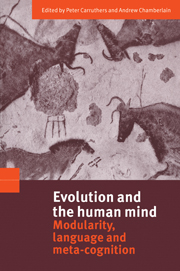Book contents
- Frontmatter
- Contents
- List of contributors
- Preface
- 1 Introduction
- 2 Massively modular minds: evolutionary psychology and cognitive architecture
- 3 Individual differences in early understanding of mind: genes, non-shared environment and modularity
- 4 Darwin in the madhouse: evolutionary psychology and the classification of mental disorders
- 5 Evolution of the modern mind and the origins of culture: religious concepts as a limiting-case
- 6 Symmetry and the evolution of the modular linguistic mind
- 7 Evolution, communication and the proper function of language
- 8 The evolution of knowledge
- 9 Mind, brain and material culture: an archaeological perspective
- 10 The evolution of strategic thinking
- 11 On the origin of the human mind
- 12 The evolution of consciousness
- 13 Evolution, consciousness and the internality of the mind
- References
- Author index
- Subject index
2 - Massively modular minds: evolutionary psychology and cognitive architecture
Published online by Cambridge University Press: 18 December 2009
- Frontmatter
- Contents
- List of contributors
- Preface
- 1 Introduction
- 2 Massively modular minds: evolutionary psychology and cognitive architecture
- 3 Individual differences in early understanding of mind: genes, non-shared environment and modularity
- 4 Darwin in the madhouse: evolutionary psychology and the classification of mental disorders
- 5 Evolution of the modern mind and the origins of culture: religious concepts as a limiting-case
- 6 Symmetry and the evolution of the modular linguistic mind
- 7 Evolution, communication and the proper function of language
- 8 The evolution of knowledge
- 9 Mind, brain and material culture: an archaeological perspective
- 10 The evolution of strategic thinking
- 11 On the origin of the human mind
- 12 The evolution of consciousness
- 13 Evolution, consciousness and the internality of the mind
- References
- Author index
- Subject index
Summary
In recent years evolutionary psychologists have defended a massively modular conception of cognitive architecture which views the mind as composed largely (or perhaps even entirely) of innate, special-purpose computational mechanisms or ‘modules’. This chapter has a pair of aims. First, I aim to dispel much of the confusion that surrounds discussions of evolutionary psychology by clarifying the massive modularity hypothesis (MMH) and contrasting it with other accounts of our cognitive architecture. Second, I aim to evaluate the plausibility of the MMH in light of the currently available arguments and evidence. Though the case in support of massive modularity fails to discriminate between MMH and other related accounts of cognition, I argue that it constitutes a plausible hypothesis that deserves to be taken very seriously. Moreover, I argue that the case against massive modularity is weak.
Introduction
What are the elements from which the human mind is composed? What structures make up our cognitive architecture? One of the most recent and intriguing answers to these questions comes from the newly emerging interdisciplinary field of evolutionary psychology. Evolutionary psychologists defend a massively modular conception of mental architecture which views the mind – including those parts responsible for such ‘central processes’ as belief revision and reasoning – as composed largely or perhaps even entirely of innate, special-purpose computational mechanisms or ‘modules’ that have been shaped by natural selection to handle the sorts of recurrent information-processing problems that confronted our hunter-gatherer forebears (Cosmides and Tooby, 1992; Sperber, 1994a; Samuels, 1998a).
- Type
- Chapter
- Information
- Evolution and the Human MindModularity, Language and Meta-Cognition, pp. 13 - 46Publisher: Cambridge University PressPrint publication year: 2000
- 34
- Cited by

